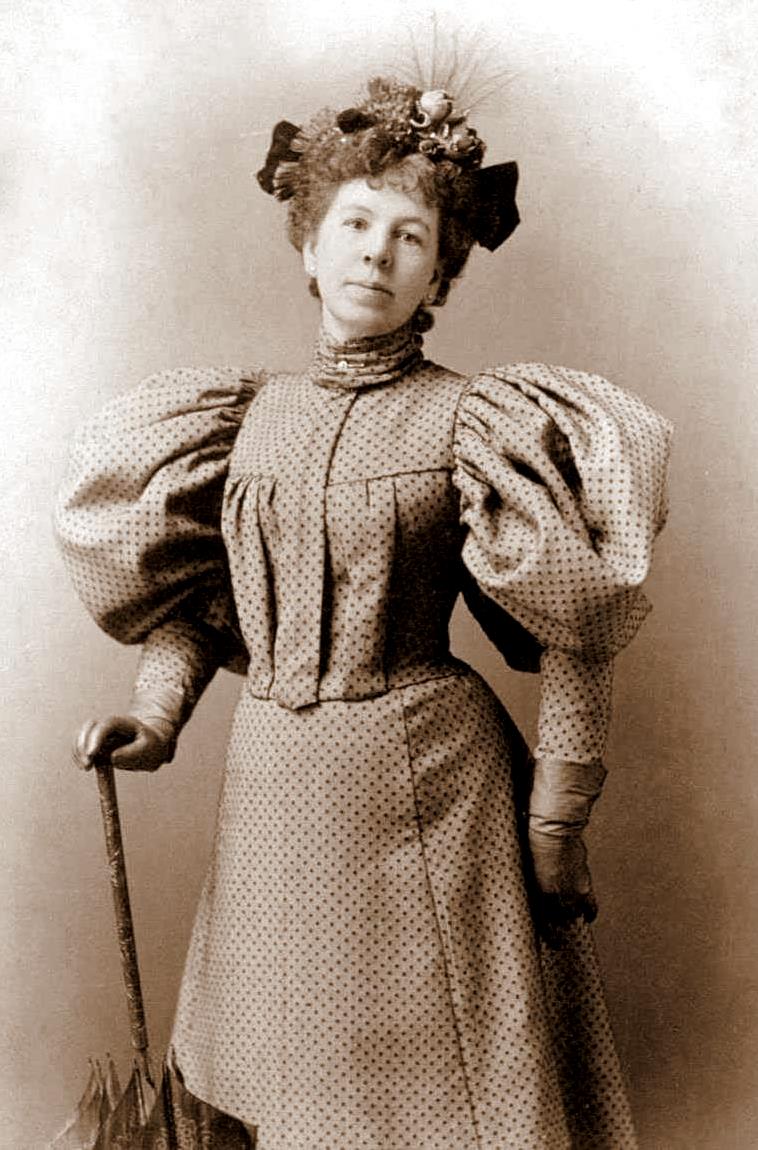 Clara Shortridge Foltz Taber, San Francisco / [Public Domain] via Wikimedia |
The first woman to practice law in California, a crusader for women’s voting rights, and a founder of the modern public defender system, Clara Shortridge Foltz was a self-described fighter.
"I am descended from the heroic stock of Daniel Boone and never shrank from a contest nor knew a fear," she wrote in a 1918 issue of the New American Woman, a magazine she published from 1916 to 1918.
Clara Shortridge was just 15 years old when she eloped with Iowa farmer Jeremiah Foltz in 1865. In 1868, Jeremiah Foltz moved his young wife and their three children to Portland, Ore. Clara started a dressmaking business to make ends meet. She was just beginning to turn a profit when the sheriff showed up and confiscated her sewing machine to pay her husband’s debts. No lawyer would represent Clara in the case, and her anger and desperation led her to make a vow – one day, she would learn the law for herself and fight for the rights of women.
In 1875, with four children and a fifth on the way, Jeremiah Foltz moved the family to San Jose, Calif., which was home to a powerful women’s suffrage movement. Clara threw herself into the fight. Even when her husband suddenly abandoned her and the children two years later, she did not give up the cause. Instead, she earned money as a public speaker in support of women’s rights. "Did God fail in His last crowning work when He made woman, that she is not the equal of man? Genius, talent and hard labor know no sex," she said in one of her speeches. At the same time, Foltz began studying on her own to become a lawyer.
Unfortunately, California law stated that an applicant to join the Bar had to be at least 21 years of age, white, "of good moral character," in possession of "learning and ability" and male. With the help of fellow suffragist Laura deForce Gordon, publisher of a small California newspaper, Foltz drew up the Women’s Lawyer Bill. The bill simply changed the word 'male' to 'person.' When her bill came up for a vote before the California Legislature in 1878, Foltz made the trip to Sacramento in the caboose of a cattle train, subsisting on hard biscuits and boiled eggs she’d stuffed in her pockets.
"The bill met with a storm of opposition such as had never been witnessed upon the floor of a California Senate," Foltz wrote in her autobiography. "Narrow-gauge statesmen grew as red as turkey gobblers mouthing their ignorance against [it]."
Still, Foltz's bill made it through, passing by the narrowest of margins. That same year Foltz passed a three-hour oral exam to become California's first licensed female attorney.
 Clara S. Foltz Oscar T. Shuck / [Public Domain] via Flickr |
Though Foltz won her first couple of cases in court, she decided to enroll at Hastings College for more traditional legal schooling. When the college denied her admission, she sued, tried the case herself and won. By this time, her own client list had grown so long, she was too busy to attend.
Foltz traveled the country trying cases, setting up practice in such cities as San Diego, Denver and New York. For a brief time, she even published a newspaper, The San Diego Bee. Everywhere she went, she encountered prejudice from her male counterparts, but her quick wit served her well. Once, when an opposing attorney contemptuously referred to her as a "lady lawyer," Foltz answered that she could not return the compliment for she "never heard anybody call him any kind of lawyer at all."
Throughout her life, Foltz fought for the underdog, and her next causes were no exceptions. She spearheaded movements to improve prison conditions and state parole systems and fought for separation of juvenile and adult prisoners. She also led a movement that established public defender systems (a system under which lawyers are provided free of charge to the poor) in 30 states.
In addition to pursuing her career in law, Foltz remained active in politics and the fight for women’s rights. She is credited with drafting California’s suffrage law, which passed in 1911, though she was the only one of her friends still alive to cast a ballot. In 1930, at age 81, Foltz entered California’s Republican Gubernatorial primary in which she received a respectable number of votes, although not enough to win the election.
Before her death in 1934, Foltz described the legal profession as "hard, unpoetic and relentless." Though the profession may have treated Foltz harshly in her day, it is now paying her delayed respects. In 1991, Hastings Law School awarded her an honorary degree, and in February 2002, the Los Angeles downtown Criminal Courts Building was renamed the Clara Shortridge Foltz Criminal Justice Center. U.S. Supreme Court Justice Sandra Day O’Connor presided at the ceremony.
Page created on 6/26/2004 4:33:22 PM
Last edited 7/15/2020 1:21:48 AM
